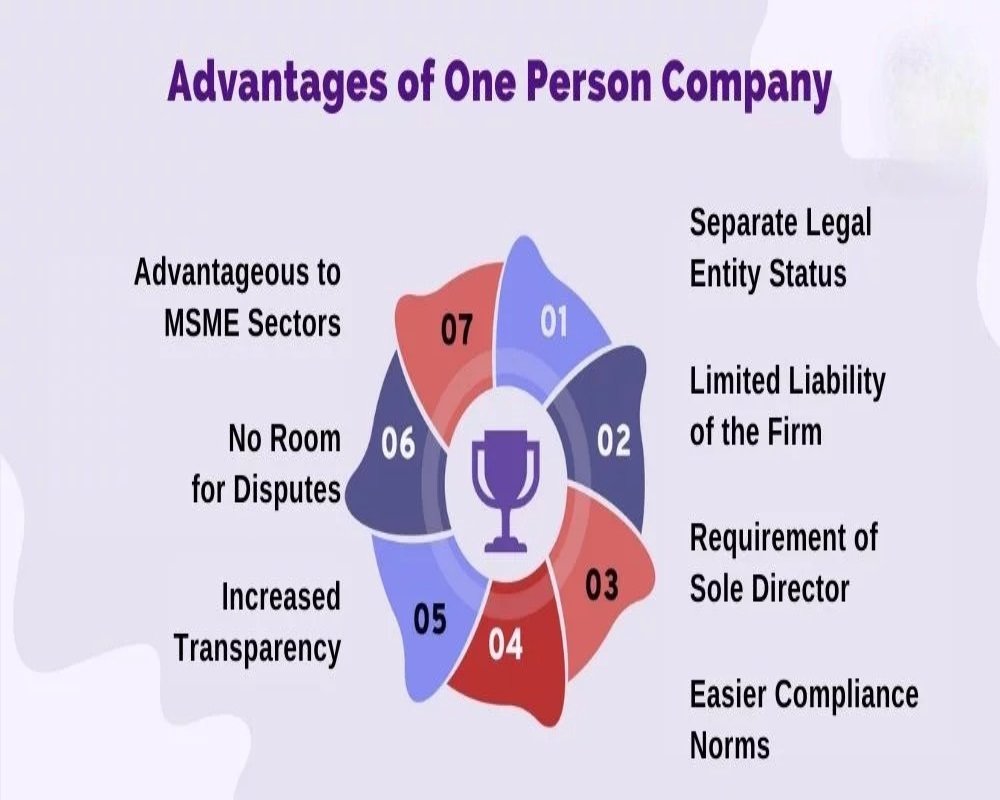Introduction
The One Person Company (OPC) model was introduced in India under the Companies Act, 2013 to empower individual entrepreneurs by offering a legal structure that combines the flexibility of a sole proprietorship with the benefits of a corporate entity. This hybrid form is ideal for those who want to own and manage a business independently while enjoying limited liability, simplified compliance, and full control over operations. The OPC structure offers several practical advantages that make it a preferred choice for freelancers, consultants, service providers, and startups. This article explores the key practical benefits of running an OPC in India.
Limited Liability Protection
One of the most important advantages of an OPC is limited liability. The personal assets of the sole member are protected in case of business losses, debts, or legal claims. Liability is limited to the amount invested in the company, offering financial security and encouraging entrepreneurship without personal financial risk.
Separate Legal Identity
An OPC is a separate legal entity distinct from its owner. This means the company can enter into contracts, acquire assets, sue or be sued in its own name. This distinction gives the business greater legal standing and credibility when dealing with clients, banks, vendors, and government agencies.
Complete Control and Decision-Making Power
Since an OPC is owned and managed by a single individual, there is no risk of internal conflict, disagreements, or dilution of authority. The sole member enjoys absolute control over strategic and operational decisions, making it easier to implement ideas, respond to market needs, and act quickly.
Ease of Incorporation and Operation
The incorporation of an OPC is simple and fully online through the MCA portal, using the integrated SPICe+ form. There is no requirement for a minimum paid-up capital, and the legal documentation is relatively straightforward. Post-incorporation, day-to-day management is simpler due to the absence of partners or a board.
Lower Compliance Burden
OPCs enjoy several compliance exemptions, such as:
- No requirement to hold annual general meetings (AGMs)
- Relaxation in the number of board meetings
- Simplified filing using Form MGT-7A for annual returns
- Exemption from preparing cash flow statements
These relaxed norms make OPCs easier and less expensive to manage compared to other corporate forms.
Business Continuity through Nominee Provision
An OPC must appoint a nominee during incorporation who takes over in the event of the member’s death or incapacity. This provision ensures continuity of business operations and protects stakeholders from disruption, unlike a sole proprietorship which typically dissolves with the owner.
Professional Image and Market Credibility
An OPC enjoys the status of a private limited company, which enhances its professional reputation. Clients and partners—especially large corporates and international businesses—are more likely to trust and engage with a registered OPC than with an unregistered sole proprietorship. This leads to better contracts, partnerships, and growth opportunities.
Eligibility for Schemes and Registrations
OPCs can register under government initiatives such as:
- MSME registration
- Startup India program
- GST, PF, and ESIC registrations
These registrations provide access to subsidies, tax exemptions, funding opportunities, and improved market positioning. The formal structure of an OPC helps the business qualify for these programs easily.
Conclusion
Running an OPC provides a unique blend of corporate benefits and individual flexibility. With limited liability, full ownership, legal recognition, and simplified compliance, OPCs are an excellent choice for solo entrepreneurs looking to formalize their ventures. The structure supports innovation, reduces risk, and creates a strong platform for business growth and scalability. As India’s startup and self-employment culture continues to expand, the OPC model stands out as a powerful vehicle for turning ideas into legally recognized and professionally run enterprises.
Hashtags
#OPCAdvantages #BusinessEfficiency #CostEffective #LimitedLiability #Simplicity #Entrepreneurship #SmallBusiness #StartupSuccess #Flexibility #TaxBenefits #OperationalControl #RiskManagement #BusinessGrowth #LegalProtection #FinancialIndependence #StreamlinedOperations #SoloEntrepreneur #BusinessStructure #Innovation #SuccessMindset


0 Comments